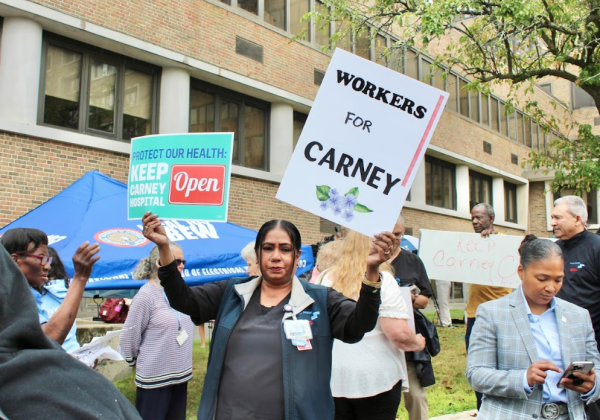February 12, 2025

The scene outside Carney Hospital during a July 2024rally by workers and patients who tried in vain to stop the hospital's closure. Cassidy McNeeley photo
Gov. Healey will be running for reelection, she told reporters last week. And while it’s too early to know if she’ll have an opponent in the 2026 Democratic primary and the general election, it will be good for all of us if she faces a serious challenge.
As spelled out in this space last week, it’s healthy for the city of Boston that our mayor – Michelle Wu – will face competition in the form of Josh Kraft in this year’s non-partisan city election. Competitive elections keep candidates – especially incumbents – hustling, on their toes, and maybe even a little nervous about the consequences of their decisions and policies.
In the context of the governor, that’s particularly true in the case of the ongoing debacle surrounding the closure of Carney Hospital. Dorchester, Mattapan, and adjacent communities are less safe, less healthy, and more vulnerable because of decisions made at the top levels of state government in the context of the Steward Health Care meltdown that unfolded over the course of 2024.
The Healey administration sanctioned and facilitated the closure of Carney – and a second community hospital in the rural Nashoba Valley – as part of their larger strategy to prevent a wider, statewide crisis. But in doing so, and particularly by fast-tracking the closure of Carney last summer, the governor made a calculation that our communities – some of the neediest and most exposed to existing health disparities – would bear the brunt of the hurt. It was a callous and outrageous rebuke to people who, for many decades, have been reliable rank-and-file allies to the Democratic ticket in this state.
There should be consequences for the betrayal and the lack of urgency to fix the mess left behind, and that should come, at least in part, by voters and activists locally holding back on any commitment to automatically support this governor’s reelection. They should wait for alternative candidacies, including from rival parties, to see how Healey and her team proceed in the coming weeks and months.
A 33-member working group set up by Healey, but mainly organized and staffed by Mayor Wu’s cabinet, has been meeting for several months now to review the state of Carney’s hollowed-out campus and make recommendations about what Healey and Wu should do next to restore urgently needed health care delivery to this part of Boston and points south. Last week, as reported here, Wu’s health chief Dr. Bisola Ojikutu (who has been diligent and responsive to our inquiries), said that the group expects to issue its findings to the governor and mayor early next month.
What they recommend will be closely watched and scrutinized in this space and elsewhere. But so, too, will be how urgently and sincerely Maura Healey and her chosen lieutenants move to act on the group’s report.
Will they suspend their own rules and expedite a solution as they did to protect other constituencies in Massachusetts last year? Or will they decide, as they did last year, that our families and neighbors matter less on their spreadsheets. Will they put up taxpayers’ dollars to help subsidize a new operator and exercise rarely used eminent domain powers – as they did for St. Elizabeth’s in Brighton – to aid predominantly the Black and Brown, immigrant, and working-class people who live here? Or will they tell us to go to the back of the line. Again.
As last year’s presidential election results in Boston have shown, there’s already a shift underway among many voters who feel unappreciated and unheard by the political establishment. How that changes – or accelerates – will depend much on the decisions surrounding this unresolved and gaping hole in our community.


